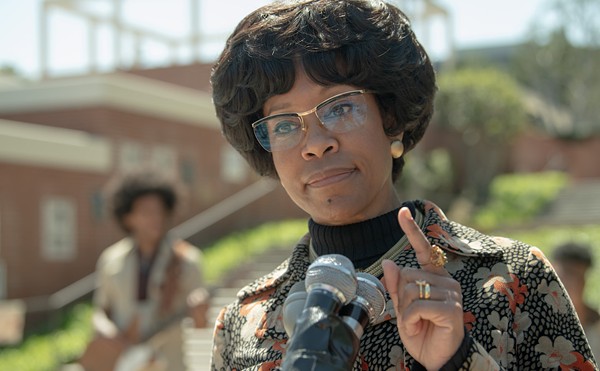The brothers originally adapted it for director and their former cinematographer Barry Sonnenfeld; he remains now only as co-producer. Beloved in the U.K., where the film is often viewed through the long lens of allegory because of its dour depiction of post-war England, the original has no such stature in the States. It's free to be tinkered and toyed with, to the point where this adaptation shares only premise and title with its ancestor while wrapping Tom Hanks in Guinness' professorial splendor. The Coens have moved it to their favorite setting, the dreamlike American South, where it looks like 1934 and sounds like a gospel revival, with songs chosen by mixtape master T Bone Burnett; this could be happening the same week as O Brother, Where Art Thou? or yesterday.
The Coens once more convince a Movie Star to tousle his image till he looks like a brilliant boob; you go to the Coens when you want to look like a clown, not a prince. Not since he was a spry, up-for-anything comer has Tom Hanks appeared so giddy onscreen, and it's a welcome relief; for too long the former comic has been weighed down by the burden of iconicity, which smothers the spark and exuberance that initially made him a star. Hanks doesn't have to carry the whole movie -- in his Kentucky-fried get-up, looking slightly older than his 47 years, he doesn't appear able to carry anything over fifteen pounds -- but he holds it together, because his jive-talking Mississippi con man, Goldthwait Higginson Dorr III, Ph.D., isn't played like a put-on.
Dorr, boss of a rinky-dink band of safecrackers and criminals, may indeed have studied at Oxford and may indeed be a professor of Poe and dead languages, as he insists early on; there's more to Dorr than meets the ear. Hanks doesn't condescend to the character and treat him like an idiot doomed for his comeuppance; rather, he's a smart man who just happens to run up against a cagier woman, Mrs. Munson, played by Soul Food's Irma Hall with engaging crankiness. Mrs. Munson, who sends $5 every month to Bob Jones University, takes particular delight in complaining to the sheriff (George Wallace) about rap music by repeating, "I left my wallet in El Segundo," a chorus she heard and can't forget.
Dorr's gang, which he's hired through a help-wanted ad to tunnel into a riverboat casino's vault, is a mismatched band of miscreants, dolts and gangstas: Marlon Wayans as Gawain MacSam, foul-mouthed inside man; J.K. Simmons as Garth Pancake, a demolitions expert in Jack Hanna's khaki short-shorts; Tzi Ma as The General, a doughnut-store owner with Hitler's mustache and temperament; and Ryan Hurst as Lump Hudson, a college football player who's taken a thousand too many shots to the head. Longtime Coen brothers cinematographer Roger Deakins introduces Lump by literally putting the audience inside his helmet; you feel the concussion coming on.
Using Mrs. Munson's basement, the crew tunnels easily enough into the casino's vault but must deal with the old lady once she finds out they aren't actually Renaissance-period chamber musicians training downstairs; hence the title, as the movie spends its second half trying to decide which of the gang will have to off Mrs. Munson. Here the movie devolves into morbid slapstick tinged with an odd kind of sentimentality; Gawain flashes back to his own unhappy childhood, imaging Mrs. Munson as his own mother, which renders him unable to pull the trigger.
The Ladykillers fits snugly among the Coens' lighter and breezier movies -- the ones you forget after you see them once and begin to appreciate and finally adore the more often you revisit them. (Who didn't think The Big Lebowski was an innocuous throwaway the first time they saw it, only to find themselves years later insisting the rug really ties the whole room together?) It doesn't help that the opening twenty minutes, during which the brothers introduce a band of blundering thieves one by one, are so brilliant they almost make the rest of the film a disappointment. After a while, the movie just seems to run out of breath.





